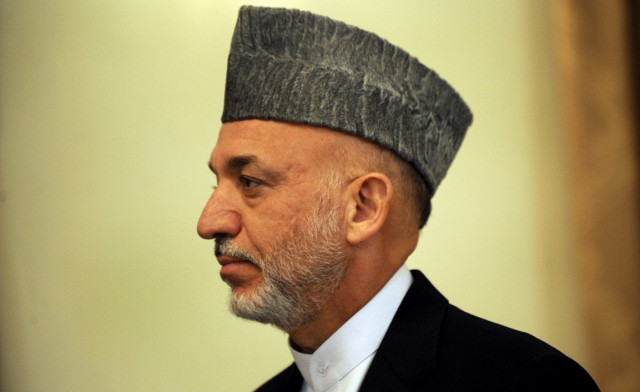Afghan peace plans in limbo as US placates Karzai
The Taliban office in Doha amended the name plate on their office to remove 'Islamic Emirate of Afghanistan' on it.

Karzai told Kerry that Afghan public opinion was "extremely negative" over the way in which the Taliban office had been unveiled. PHOTO: AFP/FILE
Karzai and US Secretary of State John Kerry spoke twice by telephone after the Afghan government became enraged that the office was opened in a blaze of publicity and US officials were apparently about to arrive for talks.
The office used the formal name of "Islamic Emirate Of Afghanistan" from the rebels' 1996-2001 government, and a Taliban spokesperson at the opening press conference declined to say they supported the peace process.
"John Kerry assured that the Qatari government has removed the 'Islamic Emirate of Afghanistan' sign from the Taliban office and the office is for peace talks only," a statement from Karzai's office said late Wednesday.
Karzai told Kerry that Afghan public opinion was "extremely negative" over the way in which the Taliban office had been unveiled in an event that many experts described as an international publicity coup for the insurgents.
"The opening of this office has made the Taliban look strong, the Americans desperate and President Karzai angry," the Afghanistan Analysts Network said in a briefing note.
Afghanistan 1400, a civil youth group, said the office should be used to hold Taliban leaders to account for their crimes.
"It only reminds Afghans of the horror and oppression of the Taliban regime, and their brutality under the same banner in recent years," it said.
US deputy ambassador Rosemary DiCarlo told a UN Security Council meeting on Afghanistan Thursday that the correct name for the office was the "Political Office of the Afghan Taliban".
It emerged later in the day that the plaque on the office in Doha too had been altered to remove the wrong name.
"We have underscored that the office must not be treated as, or represent itself as, an embassy or other office representing the Afghan Taliban as an emirate, government, or sovereign," the US envoy said.
With the US-led NATO combat mission due to end next year, US officials are determined to resume talks with the Taliban after tentative contacts limited to a prisoner swap collapsed last year.
And NATO Secretary General Anders Fogh Rasmussen said Thursday he hoped planned US-Taliban peace talks could start "sooner rather than later".
"I think peace talks could reinforce security gains and further contribute to Afghanistan's security", he told a press conference in Brussels.
Karzai, the only leader of Afghanistan since the Taliban were toppled in the 2001 US-led invasion, opposes bilateral US-Taliban talks.
Neighbouring Pakistan on Thursday pledged its backing for a solution ending the 12-years of violence in Afghanistan.
"We have welcomed this process and we believe that all factions in the Afghan conflict and all groups should join the process of dialogue," foreign ministry spokesperson Aizaz Chaudhry told reporters in Islamabad.
Support from Pakistan, which is accused of tacitly providing support for the Taliban, is seen as crucial for the chances of any peace deal emerging.
On Wednesday Karzai broke off ongoing Afghan-US talks on an agreement that would allow Washington to maintain soldiers in Afghanistan after the NATO combat mission ends.
The US State Department dismissed reports which said the United States had scheduled talks with the Taliban for this week.
"Reports of a meeting being scheduled or on the books aren't accurate," spokesperson Jen Psaki told reporters.
"We are now in consultations with the Afghan leadership and the High Peace Council on how to move forward," she said.
The High Peace Council is the Afghan government body in charge of leading peace efforts with the Taliban.
In response to the talks suspension, US President Barack Obama said he always expected "friction" at Afghan reconciliation talks but voiced hope that "despite those challenges the process will proceed".
Troubled relations between Karzai and his US backers have degenerated into public rows in the past, but many Afghans reacted with scepticism to news that the Taliban could be ready to enter peace talks.
Karzai on Tuesday seemed to embrace the opportunities presented by the opening of the Taliban office in Qatar when he attended NATO's formal transfer of responsibility for nationwide security to Afghan forces.
About 100,000 foreign combat troops, 68,000 of them from the US, are due to withdraw by the end of next year.



















COMMENTS
Comments are moderated and generally will be posted if they are on-topic and not abusive.
For more information, please see our Comments FAQ